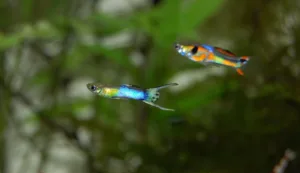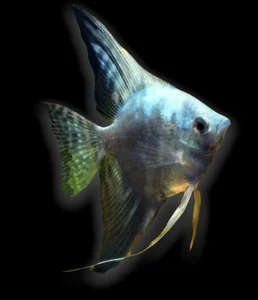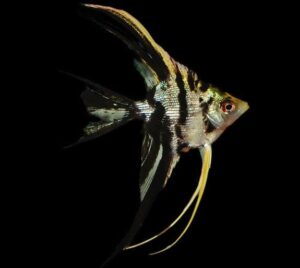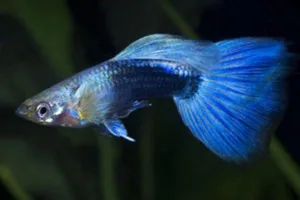Yes, guppies will eat their fry. Guppies are omnivores, meaning they eat both plants and animals, and their fry are a good source of protein for them. Guppies are also relatively good at hunting prey, and they will often eat their fry if they have the opportunity.
The Natural Instinct
Guppies, like many other fish species, do have a natural instinct to eat their own fry. In the wild, this behavior helps ensure the survival of the fittest, as only the strongest fry have a better chance of escaping predation from their own parents and other potential threats. However, in the controlled environment of an aquarium, guppy parents might not always exhibit this behavior to the same extent.
There are a number of reasons why guppies might eat their fry. One reason is that they are hungry. Guppies have a high metabolism, and they need to eat frequently. If they are not fed enough, they may resort to eating their fry.
Another reason why guppies might eat their fry is that they are stressed. Stress can be caused by a number of factors, such as overcrowding, poor water quality, and the presence of predators. If guppies are stressed, they may be more likely to eat their fry.
Finally, guppies may eat their fry because they are simply following their instincts. Guppies are wild animals, and they have evolved to eat their fry in order to survive. In the wild, guppies have many predators, and eating their fry can help to ensure that the species survives. How to Breed Guppies:
If you are concerned about your guppies eating their fry, there are a few things you can do:
Factors Influencing Fry Survival
Several factors can influence whether guppy parents will eat their fry, including:
- Tank Setup: The presence of ample hiding spots and plant cover can significantly increase the survival rate of guppy fry. Live plants, moss, or plastic decorations provide sanctuary for the fry to evade their parents. How to Set Up a Guppy Fish Tank: The 10 Step Guide for Beginners on setting up a guppy fish tank
- Guppy Strain: Different strains of guppies may exhibit varying levels of parental aggression. Some strains are more likely to eat their fry than others, so choose your guppies wisely.
- Diet: Proper nutrition can play a role in the parents’ behavior. Guppy parents may be less inclined to eat their fry if they are well-fed and not in need of additional nutrients.
- Water Quality: Maintaining good water quality Guppy Fish Tank Cycling: Ensuring a Healthy Start for Your Guppy Fish is essential for the health and well-being of your guppies, which can, in turn, influence their behavior towards their fry.
- Age of Parents: Young guppy parents, especially first-time breeders, may be more prone to eating their fry. As they gain experience, they might become more tolerant of their offspring.
- Stress Levels: High-stress levels can lead guppy parents to become more aggressive towards their fry. It’s essential to minimize stress factors in the aquarium environment.
Ways to Protect Fry
If you want to maximize the survival of guppy fry, consider taking the following steps:
- Provide Hiding Spots: Adding dense vegetation, such as live plants or moss, offers hiding spots for fry to escape their parents.
- Separate Fry: If you’re concerned about fry survival, you can set up a separate breeding tank. Transfer the pregnant female to a breeding box or another tank to protect the fry from being eaten.
- Feed Parents Well: Make sure your adult guppies are well-fed to reduce their inclination to eat the fry.
- Maintain Water Quality: Regular water changes and water parameter monitoring are essential to minimize stress in your guppy population.
Conclusion
- Provide your guppies with a well-balanced diet. This will help to reduce their hunger and make them less likely to eat their fry.
- Reduce stress in your tank. This can be done by providing your guppies with plenty of hiding places, keeping the water clean, and avoiding overcrowding.
- Separate the fry from the adult guppies. This can be done by using a breeding net or by moving the fry to a separate tank.
By following these tips, you can help to reduce the risk of your guppies eating their fry.
Here are some additional tips for protecting guppy fry:
- Feed the fry live food, such as brine shrimp or microworms. This will provide them with the nutrients they need to grow and develop quickly.
- Clean the tank regularly to remove any uneaten food or waste. This will help to prevent the water from becoming polluted, which could stress the fry.
- Monitor the fry closely for any signs of illness or injury. If you notice any problems, separate the affected fry from the others immediately.
In conclusion, guppies do have a natural instinct to eat their fry, but with the right precautions and a well-planned tank setup, you can increase the chances of fry survival. Guppies are known for their easy breeding, and understanding their behavior is crucial for successful breeding projects. By providing hiding spots, monitoring water quality, and considering the factors mentioned above, you can enjoy the sight of guppy fry growing up healthy and vibrant in your aquarium. Remember that each guppy parent may have its own level of aggressiveness, so observing their behavior is key to ensuring the well-being of your guppy fry.
With proper care, guppy fry should grow and thrive.











